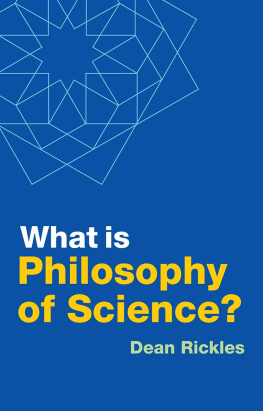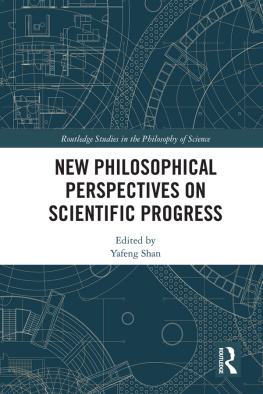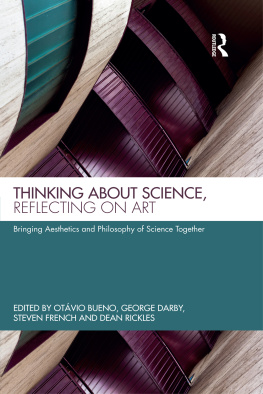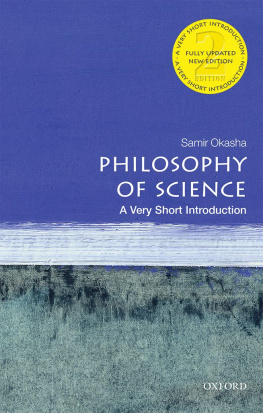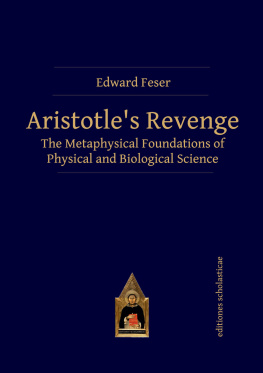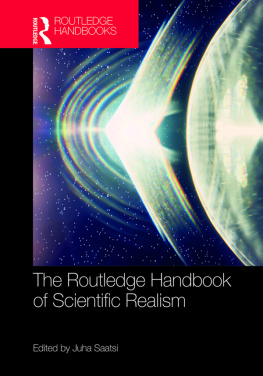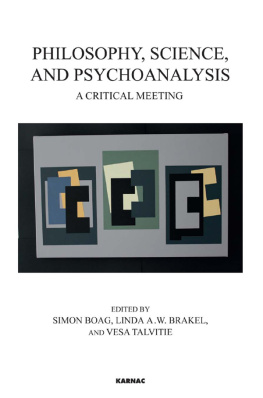
Politys What is Philosophy? series
Sparkling introductions to the key topics in philosophy, written with zero jargon by leading philosophers.
Stephen Hetherington, What is Epistemology?
Dean Rickles, What is Philosophy of Science?
James P. Sterba, What is Ethics?
Charles Taliaferro, What is Philosophy of Religion?
What is Philosophy of Science?
Dean Rickles
polity
Copyright Dean Rickles 2020
The right of Dean Rickles to be identified as Author of this Work has been asserted in accordance with the UK Copyright, Designs and Patents Act 1988.
First published in 2020 by Polity Press
Polity Press
65 Bridge Street
Cambridge CB2 1UR, UK
Polity Press
101 Station Landing
Suite 300
Medford, MA 02155, USA
All rights reserved. Except for the quotation of short passages for the purpose of criticism and review, no part of this publication may be reproduced, stored in a retrieval system or transmitted, in any form or by any means, electronic, mechanical, photocopying, recording or otherwise, without the prior permission of the publisher.
ISBN-13: 978-1-5095-3418-0
A catalogue record for this book is available from the British Library.
The publisher has used its best endeavours to ensure that the URLs for external websites referred to in this book are correct and active at the time of going to press. However, the publisher has no responsibility for the websites and can make no guarantee that a site will remain live or that the content is or will remain appropriate.
Every effort has been made to trace all copyright holders, but if any have been overlooked the publisher will be pleased to include any necessary credits in any subsequent reprint or edition.
For further information on Polity, visit our website: politybooks.com
Preface
[N]o science is possible without a philosophical background.
Ralf Hagedorn
There is no such thing as philosophy-free science; there is only science whose philosophical baggage is taken on board without examination.
Daniel Dennett
Science and Philosophy must supplement each other, urge each other forward. Without science, philosophy is null; without philosophy, science is blind.
Antoine Augustin Cournot
Despite these grand proclamations of a necessary union between science and philosophy, philosophy books have an unfortunate tendency to be placed near the New Age, Spiritualism, and Mysticism shelves of book sellers, far away from the proud, upstanding science books. Yet philosophers of science are usually scientist-friendly (many having trained as scientists before the switch), though they might view scientists as somewhat naive in their views of how science actually works. Scientists friendly to philosophers are, these days at least, the exception rather than the rule: now, the two subjects, philosophy of science and science itself, are viewed more in opposition than alignment one can find countless videos on YouTube of Richard Feynman, Neil deGrasse Tyson, and Lawrence Krauss and others bashing philosophy and philosophers; in his last book, the late Stephen Hawking went so far as to say that philosophy is dead, since its so out of touch with scientific developments. Ouch This was not always the case, and there are in fact signs that things are changing, with new sciencephilosophy collaborations and some scientists actively encouraging a dialogue with philosophers.
What is philosophy of science? To some extent it is the subject that attempts to provide an answer to the question what is science? Philosophy of science puts science itself under the microscope. This book will explain what this looks like. At a simplistic level, science asks why something in the world is so: what makes it go? Philosophy of science then asks what makes science go: how are its claims justified? How, if at all, are its claims distinct from other claims about the world? How is it that the claims it makes about the world can be revised if, as is often suggested, it is supposed to provide objectively true descriptions? Can its claims really be said to map onto the real world at all? Each of these questions roughly corresponds to the topics covered in the three main chapters of this book (). Each chapter concludes with a brief summary of key concepts followed by an annotated selection of readings.
This book is written for the absolute beginner with no previous exposure to philosophy of science, or science for that matter, to prepare them for more in-depth study. This is, then, intended to be more a companion to one of the many other standard textbooks rather than a standalone textbook. It aims to present concisely and in a very simple fashion the key questions and problems defining the subject of philosophy of science, describing also how it has developed as a field and how it links up to broader issues in philosophy.
References
Cournot, A. A., Essai sur les Fondements de nos Connaissances et sur les Caractres de la Critique Philosophique (Hachette, 1851).
Dennett, D., Darwins Dangerous Idea (Simon & Schuster, 1995).
Hagedorn, R., What Happened to Our Elementary Particles? In C. Enz and J. Mehra (eds.), Physical Reality and Mathematical Description (Reidel, 1974), pp. 10010.
Philosophy, Science, and History
I am assuming that the reader I am addressing is an absolute beginner, taking (or thinking of taking) a philosophy of science course for the first time; or perhaps a non-student simply wishing to have a better critical understanding of science. Its no easy task to state exactly what science is (indeed, that is one of the chief problems tackled by philosophers of science), and so it is doubly difficult to spell out what one means by philosophy of science. But this book aims to do just that. We begin in this chapter with some, at this stage very loose (and slightly repetitive to drill some major themes in), remarks about the nature of philosophy, the nature of science, and their union. Then we present the subject through its history, describing, in very broad brushstrokes, the key stages leading to the kinds of issues discussed by the philosophers of science of today. We start by sweeping aside some common misconceptions about the nature of philosophy.
Common Myths About Philosophy
Since many reading this (perhaps most, in fact) will not be philosophy students, it might be a good idea to say something about why you should study philosophy of science, and also to dispel some common myths about philosophy in general. A very entrenched myth is the following:
Philosophy is neither right nor wrong, so why bother wasting our time with it?
This is probably the most common myth about the nature of philosophy, and though it may be true for some areas of philosophy (Im not naming names ), there are many positions once held in the philosophy of science that are unanimously agreed (amongst philosophers of science) to be wrong we will come across many of these, for their problems are still instructive. For example, Karl Poppers famous position called falsificationism according to which science works by deducing testable consequences from theories (or conjectures) and then attempting to refute these consequences with experiments, the theory then surviving or dying depending on what happens is just plain wrong as a descriptive account of how science and scientists actually work. For the most part, scientists just dont operate in this way. As a prescriptive account (namely, as an account of what scientists
Next page
